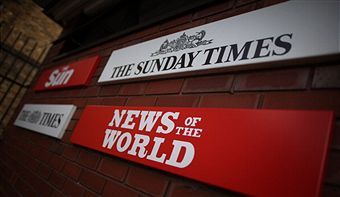 How long will it take for journalism to recover from what has been done in its name by
the News of the World? It’s possible to argue that our profession or trade, or whatever you want to call it, will regroup and find new ways of holding the powerful, the rich and the famous to
account. Rat-like cunning is an eminently transferable skill as the 200 hacks laid off from Wapping this weekend should be able to demonstrate.
How long will it take for journalism to recover from what has been done in its name by
the News of the World? It’s possible to argue that our profession or trade, or whatever you want to call it, will regroup and find new ways of holding the powerful, the rich and the famous to
account. Rat-like cunning is an eminently transferable skill as the 200 hacks laid off from Wapping this weekend should be able to demonstrate.
It can’t be said too many times that this scandal was initially brought to the public’s attention not by the police nor by parliament but by journalists. There is no one more rat-like and no one more cunning than the Guardian’s Nick Davies. And I mean that as a compliment.
But there are genuine concerns that the baby will be thrown out with the bath water. Andrew Gilligan wrote eloquently last weekend of the need for journalists to sail close to the wind. Suzanne Moore has now come out in defence of red-top title-tattle.
But these are uncertain times for journalists, not least those working at the Guardian stable, where the triumph of the phone hacking exposures has coincided with the announcement that the paper will now be a “web first” news organisation.
Those who believe that the fourth estate will easily recover from these revelations should spend some time with MPs and ask how well they have recovered from the expenses scandal. They are still feeling deeply bruised from the experience of having their collective bona fides questioned.
This is not over yet. Any enquiry into the practice of journalism in the first decade of the 21st century will find that large numbers of journalists were using all sorts of “imaginative” techniques for getting stories. The Information Commissioner’s 2006 report “What Price Privacy?” and its sequel “What Price Privacy Now?”have become the standard texts. Alistair Campbell never tires of quoting the section of the second report that details just how many national newspapers were using the services of private detectives. There were hundreds.
On this blog in January I wrote: “There are a lot of people out there in journo-land who will continue to shift uncomfortably in their seats and hope that this whole sorry affair blows over.”
Well, it isn’t blowing over and journalists and their editors will need to get the story straight about how it was that thousands of private details to found their way into contact books and databases across Fleet Street.
I believe many of those reporters were acting in the public interest, chasing down stories of alleged wrongdoing and often using private detectives to allow them to find contact details of the bad guys in order to put their claims to them before publication.
Since 2006 reporters have had to find new ways of digging the dirt. And I remain optimistic that they will always find a way. As Ryan Giggs has discovered and Rupert Murdoch has always known: great newspaper stories are created where the rat-like cunning of the reporter meets the insatiable public desire for gossip and revelation. This base, murky but sometimes magnificent profession will survive this scandal, but it will not be unchanged by it. Perhaps we will be even better at our job when we don’t pay others to do our dirty work for us.






Comments